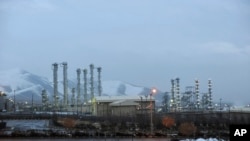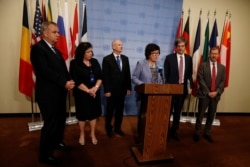Europe urged Iran on Wednesday to continue implementing its commitments under a 2015 nuclear deal and not disregard them in retaliation for the reimposition of U.S. economic sanctions.
"Today we may be at a critical juncture regarding the future of the JCPOA," European Union Ambassador to the U.N. Joao Vale de Almeida said, using the acronym for the nuclear deal. "Yet, it should be recalled that the JCPOA is a nuclear agreement that has been working and delivering on its goals. There is also no credible, peaceful alternative," he told a meeting of the U.N. Security Council reviewing implementation of the deal.
He said the EU together with other partners of the international community would continue to work "relentlessly" to preserve the deal as long as Iran abides by its commitments.
The Europeans have been doing just that for more than a year, first trying to convince U.S. President Donald Trump not to leave the deal (they failed) and now trying to keep Iran in it.
'Critical condition'
But Iran has complained that the U.S. withdrawal and reimposition of unilateral sanctions has hurt it economically. On May 8, Tehran announced that it would not commit itself to respecting the deal's limits on its enriched uranium stockpile and heavy water reserves.
Iran's U.N. ambassador, Majid Takht Ravanchi, said the JCPOA is now "in critical condition" and that the steps Tehran has announced are the "minimum measure" it could take in the face of U.S. actions.
"In cases of 'a reintroduction or reimposition of the sanctions,' Iran will have the right 'to cease performing its commitments under this JCPOA in whole or in part,'" the Iranian envoy quoted to the council from the agreement.
"Responsibility for Iran's economic woes belongs to Tehran," said U.S. envoy Jonathan Cohen. "Whether through gross economic mismanagement, corruption, or the redirection of its money for militaristic purposes around the region, Iran's own behavior has caused its economic decline."
2015 deal
The Joint Comprehensive Plan of Action (JCPOA), as the deal is formally known, was agreed in 2015 after years of negotiations among the five permanent members of the U.N. Security Council — Britain, China, France, Russia and the United States — plus Germany, with Iran.
It provides economic relief from international sanctions in exchange for Iran giving up its aspirations to build a nuclear weapon. But since the U.S. has reinstated its sanctions, Iran has said it is unfair that it should have to remain in compliance when it is no longer receiving the deal's main benefit.
The Europeans are working on ways to provide those economic benefits to Iran while not running afoul of Washington, including preparing to launch a financial instrument to allow some legal trade with Iran.
On Friday in Vienna, the European Union is hosting a high-level meeting with the deal's remaining signatories, including Iran, on reaffirming its continued implementation.





